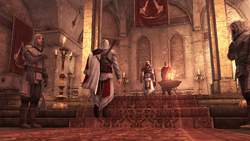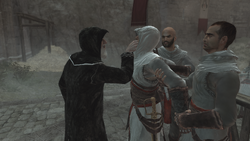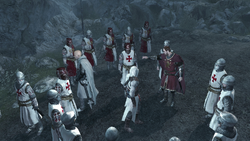| 兄弟会需要你的帮助! 本条目包含未翻译内容。您可以帮助刺客信条维基来 翻译这个条目。 |

刺客徽记
- “当其他人都盲目追寻真理的时候,记住,万事皆虚。当其他人的思想都被法律与道德所束缚的时候,记住,万事皆允。我们躬耕于黑暗却服侍于光明。我们是刺客。万事皆虚,万事皆允。”
- ―信条的格言
刺客的信条(The Creed)是刺客组织的法规和行事哲学,从第三次十字军东征时被创造至现代一直在使用。它禁止对无辜者的无谓杀戮,维护个人和组织的声望,在个人的心中和整个世界上创造和平。
The Creed first begun to take shape in 38 BCE when Bayek of Siwa, founder of the Hidden Ones–a predeccessor to the Assassins Brotherhood–enforced a veil of secrecy over his order.[1] 刺客们一代一代地通过口述将信条传递下去,并保证刺客组织的每一位成员都深刻地理解其内涵并严格遵守其内容。阿尔穆林,刺客组织曾经的领导者,就说过“如果不跟随信条,我们什么都不是。”
阿泰尔在古老的手札中提到,就算其跟随者灭绝了,信条也会继续传承下去。
三项原则
信条的主要内容是三条最基础的道德宗旨,其确保了任务的成功、感情的控制和兄弟会的安全。[2]
不得滥杀无辜
刺客组织最重要的目标之一就是世界和平。刺客们认为刺杀腐败的官员可以为百姓带来真正的安宁。杀戮无辜的旁观者和平民会导致冲突,同时毁坏刺客组织的名声。[2] It also prevented them from achieving their higher purpose, as a precise killer instead of an indiscriminate butcher. This tenet was implemented by Bayek of Siwa after Gamilat, the leader of the Nabatean rebels in the Sinai Peninsula used the slaughter of innocents as martyrs to recruit more people to the cause.
大隐于市
- “让人民来掩护你,成为人群中的一员。”
- ―阿尔穆林[来源]
隐蔽自己。刺客的目标是秘密的潜入目标身旁,并以同样的隐蔽离开。在古时,刺客们常常用使人惊奇的刺杀方式来获得敬畏。[2]
隐蔽的刺杀带来最大的好处就是对于一个普通人,刺客似乎是从空气中冒出来的,杀死目标,又突然消失。如果在之前就被发现,不仅这种超脱自然的感觉荡然无存,刺杀的难度也极大地增加。[2]
决不牵连兄弟会
- “你的行动不能威胁到我们 , 不管是直接的还是间接地。”
- ―阿尔穆林[来源]
个人的行动决不能为整体带来危险。如果一个刺客失败了,并被捕获或者追击,他决不能透露出兄弟会的任何信息,或者出卖其成员。[2]
三大讽刺
- “Do we bend the rules in service to a greater good? And if we do, what does it say of us?”
- ―Altaïr's Codex, page 4.[来源]
The three great ironies were observations that described the contradictions between the Creed, and the actions of the Assassins who followed it. They were:
- The Assassins seek to promote peace, but commit murder.
- The Assassins seek to open the minds of men, but require obedience to rules.
- The Assassins seek to reveal the danger of blind faith, yet practice it themselves.
Though seemingly hypocritical, the ironies did not undermine the Assassins' cause. Rather, they demonstrated the way in which they embraced contradiction, "that one may be two things – opposite in every way – simultaneously."[3] Another core part of the Creed is the importance of knowledge, which allows one to learn and advance. This was reflected on by Altaïr Ibn-La'Ahad when about to kill a target who was ordering a mass burning of books.
格言
- “我们的信条并未给予我们无限的自由。它指导我们变的更为明智。”
- ―阿尔穆林[来源]

在罗马的入会仪式
“万事皆虚,万事皆允。(Nothing is true,everything is permitted.)”是信条的核心部分(格言)。[2]这句话是在11世纪由记录中的第一位的刺客导师哈桑-伊·萨巴赫所提出的。
Al Mualim taught Altaïr that the maxim commanded the Assassins not to be free, but to be wise. Altaïr later explained that for a person to abide by the maxim, they had to transcend the illusion which was the world, and to "recognize that laws do not arise from divinity, but reason".[2]
Ezio Auditore da Firenze once spoke of the maxim at length with Sofia Sartor, who found it rather cynical. However, he told her that the maxim was not a doctrine to be followed, but merely an observation of the world.[4]
This maxim was spoken by all Assassins present at every new Assassin's induction into the Order, and in its original Arabic by Ezio as he presided over each ceremony.[5]
惩戒
中世纪
- “你在耶路撒冷底下自私的行为使我们都陷入了危机之中!更糟的是,你把我们的敌人带到了家里!今天每一位死去的同胞都是为你而死的!”
- ―阿尔穆林对阿泰尔说道[来源]

阿尔穆林强烈地让阿泰尔想起信条的事
On most occasions, the breaking of one or more of the tenets of the Creed led to the execution of the involved Assassin, though there have been exceptions.[2] Before the restructuring of the Order, Levantine Assassins were known to take their own life if necessary rather than compromise the Brotherhood.
During Saladin's siege of Masyaf, Ahmad Sofian was captured and interrogated by the Saracens about the identity of the Assassin who infiltrated the camp. Ahmad broke and gave the name of Umar Ibn-La'Ahad. This resulted in him breaking the third tenet of the Creed, as Umar was executed for this, and though he was spared Ahmad could not bear the shame and guilt and took his own life. Umar himself also technically broke the first and third tenets as well by killing a Saracen nobleman, who was not his target and which resulted in the Saracens electing to continue the siege unless he surrendered himself, which would have resulted in many Assassin deaths. Umar elected to give himself up for execution to save his fellow Assassins.
1191年,阿泰尔在所罗门圣殿的一次重要任务中违背了全部的三条信条。他杀死了一个无辜的老人(他认为可能会让卫兵警戒),在罗伯特·德·塞布尔面前展示出了自己的身份并最终将圣殿骑士带回了刺客的基地马斯亚夫,导致多名刺客死亡,给兄弟会带来了危险。[2]
Upon his return to Masyaf, Altaïr was publicly chastised and executed via stabbing as punishment by his Master. However, the execution was only an illusion, as Al Mualim wished to grant him a second chance. Instead, Altaïr was merely stripped of all his weapons and equipment, and demoted to the lowest rank of novice, forced to re-earn his rank through the Hunt for the Nine.[2]
Following his return from exile, Altaïr decided to eliminate those of Abbas Sofian's followers who had compromised the Brotherhood by harming civilians, while leaving alive those that still lived by the Creed.[4]
文艺复兴
- “Our tenets are clear. One of our brothers has decided to disobey them and must pay with his life.”
- ―An Assassin of Jerusalem.[来源]
1498年,佩罗托·卡尔代龙在疯狂地爱上了圣殿骑士卢克雷齐娅·博吉亚和他们的儿子之后,他毅然决然地背叛了兄弟会,违背了信条。他暴露了自己是刺客间谍的身份并杀死了他的刺客同伴以夺取圣器裹尸布。他以为裹尸布可以治愈他儿子的残疾。[6]
虽然他成功了,但有一队刺客追捕到了佩罗托,并将他杀死作为惩罚。[6]
While in the Ottoman Empire during the early 16th century, one of Ezio's apprentices broke the first tenet after mistaking a cleric for the Templar Cyril of Rhodes and rashly assassinating him. Instead of punishing him, Ezio ordered him to reflect on his mistake and gave him the chance to redeem himself when they confronted Cyril again.[4]
During this time, an Assassin of Jerusalem broke the Creed, and the Ottoman Assassins were asked to intervene. Despite his treachery, the other Assassins of his guild asked that he be executed covertly with a crossbow.[4]
海地革命
In 1791, Eseosa sentenced fellow Assassin Jeannot Bullet to death for breaking the first tenet of the Creed.[7]
法国大革命
In 1793, the French Assassin Council expelled Arno Dorian from the Brotherhood for repeatedly assassinating targets without consulting them. He was accused of compromising the Brotherhood and pursuing a personal vendetta.[8] However the expulsion was temporary as the Council decided to reinstate the young Assassin years later,[8] after he had matured and demonstrated true fidelity to the Creed.[9]
历史
古埃及
- “From this day, no Hidden One will raise a sword against an innocent. So it shall be written.”
- ―Bayek to Gamilat[来源]
The first tenet was written down after the Hidden One Gamilat provoked Romans to kill villagers to inspire the people to fight back against them. After Bayek killed him, Gamilat realized what he had done and said he deserved this. Bayek assured him from now on, all Hidden Ones will stay their blades from the flesh of the innocent.[1]
中世纪
- “虽然我在请求我的兄弟们放弃他们的仪式,我并未让他们忘记我们的信条。信条使我们成为刺客,而不是断指,也不是一个虚假的‘天堂’,更不是对毒药使用的禁止。我们对人民负责,而不是无谓的传统。”
- ―阿泰尔手札第六页[来源]
After the shame of his demotion, Altaïr more closely followed the Creed by never killing anyone other than guards or his assigned assassination targets, and remaining discreet as he performed his investigations. He was also careful to never compromise the Brotherhood, by avoiding Assassin bureaus when under pursuit.[2]

阿泰尔面对著理查和罗伯特
即使如此,阿泰尔还是在杀死八名圣殿骑士之后,无意之中违背了第三项信条。罗伯特·德·萨布尔推测出了阿泰尔的任务后,他试图让穆斯林和基督徒联合起来对抗刺客。
因为阿泰尔的目标中既有穆斯林,也有基督徒,而双方的首领萨拉丁和理查一世极有可能为了刺客这个新敌人暂时联合起来。[2]
Robert attempted to convince Richard to join forces with Saladin in an attack against Masyaf; wherein he planned to recover the Piece of Eden that he had lost to Al Mualim at Solomon's Temple. However, Altaïr's subduing of Robert in front of Richard convinced him not to attack the Assassins, and Altaïr went unpunished for this transgression.[2]
After becoming the leader of the Assassins, Altaïr began bringing the Order underground in extension of the second tenet, believing their obligation was to hide and shape the world in secret. His Assassins disagreed, but Altaïr countered that having them become a public organization had led them to be simply branded as madmen.[3]
文艺复兴
- “你不是维耶里,不要变成他。”
- ―马里奥对埃齐奥如是说道。[来源]
当埃齐奥杀死维耶里·德·帕齐之后,他对着维耶里的尸体开始咒骂。
他的叔叔马里奥觉得这是对信条的违背,因为刺客们刺杀的目的是为了让死者和刺客都找到内心的平静,而不是复仇。[3]
在埃齐奥剩下的刺客生涯中,他都小心翼翼地遵守着信条,杀死目标之后都盖上了他们的眼睛,并说‘Requiescat in Pace’(拉丁语:愿灵魂安息),表达对死者的尊重。[3]
Ezio unwittingly violated the Creed twice during his later years, killing Tarik Barleti after a case of mistaken suspicion, and then killing many civilians when he started a fire in Derinkuyu to draw out Manuel Palaiologos. Regardless, he espoused the virtues of the Creed to his apprentices, advising them to be patient in planning their assassinations so as to not compromise the Brotherhood.[4]
海盗黄金时代
- “For if nothing is true, then why believe anything? And if everything is permitted... why not chase every desire?”
- ―Edward Kenway to the Mentor Ah Tabai, 1722[来源]
During the 18th century in the West Indies, the pirate Edward Kenway, upon first hearing of the Creed, used it to justify his selfish pursuit of gold and glory - in his words, "thinking what I like and acting how I please" - even though the Assassins he came into contact with advised that he was misinterpreting its meaning. When Kenway informally joined the Brotherhood in 1720, he expressed his new belief in the Creed to the Mentor Ah Tabai; that it was only a first step to understanding, and not its final form.[10]
Edward's ally and fellow Assassin Mary Read, when telling Edward of the Creed, said that it did not call for the Assassins to act or submit, but to be wise and to choose for themselves when and how to act.[10]
The Assassin Adéwalé was another who followed the Creed's words, particularly in regards to innocents as he freed many hundreds of slaves from plantations and ships, where they endured cruel and often short lives. After a slave ship was scuttled deliberately to prevent the liberation of its cargo, Adéwalé furiously vowed revenge on the man responsible, the Marquis de Fayet of Port-au-Prince, stating that the Creed demanded his death as retribution. When he assassinated the governor, he technically violated the Creed's peace accord by stating that he wanted De Fayet to suffer and beg for his life before tearing his stomach with a machete, ensuring the man's painful death.
美国革命
- “Assassins are meant to be quiet. Precise. We do not go announcing conspiracies from the rooftops to all who pass by!”
- ―Achilles Davenport to Connor.[来源]
During the American Revolutionary War, Connor allied himself with the Continental Army and became close friends with George Washington. However, his mentor Achilles deplored the idea of telling Washington of the Assassins and Templars, as he felt the Assassins should be a secretive group.[11]
On the other hand, Connor's Kanien'kehá:ka upbringing, which taught him compassion and respect for all living things, led him to extend the first tenet of the Creed to trying to spare the Templars, including William Johnson and his father Haytham Kenway. Achilles had to repeatedly remind his protege that the Assassins deemed it necessary for people like them to die.[11]
Achilles warned against Connor's hope to reconcile with his father, the Colonial Grand Master.[11] After killing his father, Connor chose to compromise in a small way by acknowledging Haytham was right about human nature, but would hope for a better future instead of lapsing into following Templar logic.[12]
现代
虽然他自己也是个刺客,戴斯蒙德·迈尔斯对信条的遵守主要还是在Animus中为了保持和他祖先的同步时展现出来的。[2]
从某种意义上来说,在被阿布斯泰戈抓住之前,他一直在遵守着第二条信条,小心翼翼的隐藏自己的身分。多年来,他能够避免使用他的真名或信用卡来绕过圣殿骑士的侦察,只是在为了自己的摩托车申请驾照泄漏的指纹而被捕获。[2]
During the search for the second prong of the Trident of Eden, the Assassin Yanmei enlightened Natalya Aliyev, who disagreed with Assassins' absolute obedience to the Creed, on the ironies of the Creed and how it truly commands them to be wise.[13]
阐释
阿泰尔·伊本·拉阿哈德
阿泰尔与阿尔莫林关于信条的问答:
-何为真实?
-我们对自己报以信心。我们看到世界的本来面目,并且希望全人类都能够看到。
-何为世界?
-一个幻象。我们可以像他人一样选择盲从,也可以选择超越。
-何为超越?
-铭记万事皆虚,万事皆允。我们的信条并非给予我们行事的自由,而是要求我们寻找智慧。
埃齐奥·奥迪托雷
……但这并非教条,而是洞察现实本质的结果。所谓万事皆虚,是要认识到社会之根基是何等脆弱,而我们必须成为人类文明的守护者。所谓万事皆允,是要懂得我们是自己行为的主宰者,因而无论结果是荣耀还是悲哀,我们都必须一并承受。
爱德华·肯维
阿·塔拜与爱德华关于信条的问答:
-你是如何看待我们的信条的?
-很难说。因为如果万事皆虚,那又为什么要去相信?如果万事皆允,那又为什么不去追求所有的欲望?
-是啊,为什么呢?
-也许这个概念只是智慧的雏形,而非其最终的模样。
阿尔诺·多里安
“刺客信条教导我们诸行皆被允许。曾经,我认为那是为所欲为的自由,是为了追寻理想可以不计代价。然而如今我明白,这信条并非一纸允诺,而是一条警示。理想大容易让步于教条,而教条终将湮灭于狂热。没有什么权威能丈量我们所作出的的判断,也没有什么至高无上的神灵能惩戒我们的罪行。最终,只有我们自己可以避免走进迷信的深渊,也只有我们自己可以决断,我们所选择的路是否要付出太高的代价。
“我们坚信自己是救赎者和复仇者。我们向反对我们的人宣战,他们也以战争回馈我们。我们渴望在世界上留下自己的足迹,尽管我们常为那些默默无名的斗争而献出生命。我们所做的一切,我们所成为的一切,皆从我们自身开始,也于我们自身结束。”
经验真理
“醒来吧——成就混沌之存在。世间神明不过如你我一般。
Wake up. Be the chaos that comes to be. Gods are just like you and me.
“牢记,
REMEMBER.
“无物为真,诸行皆可。”
Nothing is REAL, everything is permitted.
琐闻趣事
- 在《刺客信条》中,阿泰尔可以随便杀死马斯亚夫的守卫,但不会失去同步。
- 同样地,完成主线后阿泰尔可以随意杀死平民。
- “万事皆虚,万事皆允(Nothing is True,Everything is Permitted)”一语来自弗拉基米尔·巴托(Vladimir Bartol)所著《鹰之巢(Alamut)》,刺客信条的主要灵感来源。在书中,这条格言是伊斯玛仪派信徒的至高信仰,而这派信徒后来变成了历史上的哈萨辛派。
- The maxim of the Creed was translated and used in both Assassin's Creed and Assassin's Creed II, in the words exchanged with the final target. "Laa shay'a waqi'un moutlaq bale kouloun moumkine" was spoken by Altaïr to Al Mualim, and "Nulla è reale, tutto è lecito" was spoken by Ezio to Rodrigo Borgia.
- 阿拉伯语的格言仍然在文艺复兴时期的新人入会仪式中使用;马里奥·奥迪托雷在埃齐奥·奥迪托雷的入会仪式上,以及在埃齐奥在罗马的学徒时期。
- 2017年,蕾拉·哈桑在通过便携式Animus探索巴耶克的基因记忆时发现了传讯者传达给她的讯息。在传讯者最终留言的最后,一个男性传讯者这样对蕾拉说道:化身将成之为混沌,你我无异于诸神。无物为真,诸行皆可。(Be the chaos that comes to be, Gods are just like you and me. Nothing is REAL, everything is permitted.)这与刺客信条的“Nothing is ture”有一字之差。虽然都有“真实”的含义,“true”偏向真理之真,“real”偏向现实之真。Nothing is real 更侧重的是虚拟与现实之间的关系,或许是在启发蕾拉重新认识其所在的现实世界。
参见
- ↑ 1.0 1.1 《刺客信条:起源》 – 《无形者》 – 《顧顾全大局》
- ↑ 2.00 2.01 2.02 2.03 2.04 2.05 2.06 2.07 2.08 2.09 2.10 2.11 2.12 2.13 2.14 《刺客信条》
- ↑ 3.0 3.1 3.2 3.3 《刺客信条II》
- ↑ 4.0 4.1 4.2 4.3 4.4 《刺客信条:启示录》
- ↑ 《刺客信条:兄弟会》
- ↑ 6.0 6.1 《刺客信条:传承计划》
- ↑ 《刺客信条:起始 – 伊斯奥沙的手札》
- ↑ 8.0 8.1 《刺客信条:团结》
- ↑ 《刺客信条:团结 – 列王陵》
- ↑ 10.0 10.1 《刺客信条IV:黑旗》
- ↑ 11.0 11.1 11.2 《刺客信条III》
- ↑ 《刺客信条:遗弃》
- ↑ 《刺客信条:末裔 - 可汗陵》
| 如果您认为本词条还需改进,欢迎参与编辑。任何疑问请阅读欢迎页面或这里留言。 |
| ||||||||||||||||||||||||||||||



